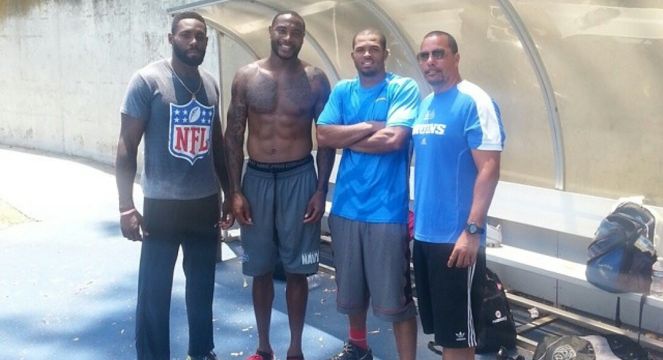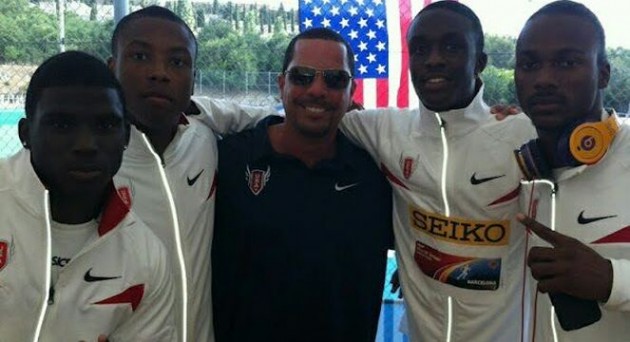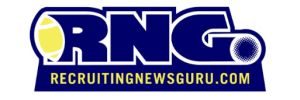In-depth interview with expert speed training coach Chris Asher

When it comes to sports everyone has an opinion. Be it the arm chair quarterback watching the game from home, the cocky up and coming athlete with much left to prove, the shock-jock style beat writers looking for attention, or our trusted “living legends” giving their two cents on local sports shows for ratings. Whether you believe the opinion of the ball boy for your favorite pro team or the casual fan that reads way too many sports articles there is a value to what each person has to share with others about a given sport especially when a proven expert at their given field speaks.
When a coach like Duke’s Mike Kyrzewski, Alabama’s Nick Saban, or Florida State’s Mike Martin speaks it holds a little more weight, actually it hold a lot of weight.
In track and field circles there are legends like former Arkansas coach John McDonnell. All McDonnell did from 1972 to 2008 is win 42 NCAA Championships for the Razorbacks hitting the rare Triple Crown five times. If ever given the opportunity to hear now retired Coach McDonnell talk about speed or athletic explosive training anyone and everyone is sure to listen, even the non-athletes.
No longer on the college circuit, but in private instruction another speed expert has emerged, Chris Asher. Asher has collegiate coaching credits being honored as a Conference Coach of the Year, NCAA West Region Coach of the Year, and has the ear, along with the deserved trust, of some of the best high school, college, and professional athletes from across the nation. Over the last 15 years he has helped shape and mold, not only some of the best track and field talent in the U.S., but some of the best athletes across the nation regardless of the sport.
In a one-on-one interview Coach Asher sat down to talk about his beginnings in track and field, some of his thoughts on speed training and instruction, and how he has formed his coaching techniques into a proven commodity over the years.
Chris, where were you born and raised?
“I was born and raised in Inglewood, California.”
What sports did you play growing up?
“Baseball, basketball, and football.”
What sports did you play in high school and in college?
“Track and Field and Cross Country.”
At what point did you know you were “fast” or when did you know you were an exceptional athlete?
“I would never consider myself fast or an exceptional athlete. I worked hard and ended up being a walk-on student-athlete at Cal State Northridge who got the most out of the talent that I had.”
What were some of the highlights, achievements, and personal honors you received in high school and college?
“My biggest honors as a collegiate athlete was getting injured and always being in the athletic training room with some sort of hamstring problem. I would work really hard at practice and in the weight room while getting injured and I said this running thing isn’t working out but I seem to be good at coaching.”
After you completed college what did you do after leaving school?
“I was hired as the sprint hurdles and relays coach at Cal State Fullerton with no experience. The head coach needed a young guy for cheap and who would hustle and work. The job paid me $2,500 for the year and I worked 40 hours plus a week on it while waiting tables at the Olive Garden to pay my bills.”
What got you into coaching?
“I would say my high school and college coaches. I had a really good high school coach (Kye Courtney – Hawthorne HS). I would stay after practice and kind of watch him. In college, when I kept getting injured and realizing that the running thing wasn’t happening the way that I wanted it to go, I started shadowing my head coach (Don Strametz – Cal State Northridge) and he started teaching me the coaching game.”
Which coach or coaches inspired you along the way?
“As mentioned already, Kye Courtney and Don Strametz were instrumental in my development as a coach. Coach Tony Veney, who happens to be one of the top sprint/hurdle teachers in the country, has always been a source of wisdom.
“On a real life coaching and motivational level, Rahn Sheffield, who is the head coach at UC Davis, has been instrumental in my development. While being a track coach in nature like me, Rahn has tutored dozens of elite NFL players such as Cam Newton, Marshall Faulk, Will Demps, etc… in the world of speed development and conditioning.”
Have you taken any principles taught to you by another coach and expanded upon those ideas?
“I have taken some from all of my coaches. As a younger coach I basically did what I was taught. As I developed into a more mature coach I developed my own philosophy and kept things that I knew that worked, which I learned from my coaches and mentors but I began to discard a lot of stuff which I felt didn’t work or didn’t fit into my philosophy of coaching.
“An old saying is, “A good coach is a good thief,” and if you are a coach and you haven’t stolen things from other coaches along the way then you probably aren’t very successful.”
Where all have you coached?
“Cal State Fullerton, Cal State Los Angeles, UCLA, two Team USA National Teams, numerous football/track and field camps and clinics, an Elite Volleyball Camp in the Philippines, and with numerous private athletes in a variety of sports from beginners to professional for speed development and athletic performance.”
What are some of the highlights and achievements reached as a college or high school coach?
“I have had several honors, Conference Coach of the Year, NCAA West Region Coach of the Year. My biggest honors were because of service in the sport though. I have served on the NCAA Board of Directors for the United States Track and Field and Cross Country Coaches association, I was the NCAA Division II Track and Field President and I served on the very prestigious NCAA Track and Field and Cross Country Committee as the NCAA West Region Representative. Serving on that committee in prospective would be like serving as one of the members of the College Football Playoff Committee or NCAA Basketball Committee which selects the field of 68 for the NCAA Tournament. Obviously the sports have differences but you can get the point.”
Who were some of the standout athletes you trained while coaching for a given program or school?
“I have had some really good ones and to not disrespect anyone but these five top collegiate standouts come to mind immediately. Kevin Howard and Brandon Campbell at Cal State Fullerton and Desi Burt, Eugene Hutchinson, and Damein White at Cal State LA. I’m sure I’ll catch hell from others for this selection as I have left off numerous All-Americans and National Champions.”
What accomplishments did those athletes attain then and maybe go on to attain after working with you?
“They were all either school record holders, conference champions, NCAA All-Americans, USA Track and Field, or US Olympic Trials Qualifiers.”
What is different now in speed training? Or if you knew “this”, whatever “this” maybe, then how would that have changed your athletic career back then?
“I would have trained harder at a younger age and put more faith into my coaches. Kids tend to think they know more and listen to outside sources when they need to trust their coaches.”
In your opinion what makes an explosive athlete?
“Someone who is dynamic, quick, fast, and strong. For a certain few this is natural but for the masses this has to be developed and cultivated.”
What keeps most athletes from reaching their full potential? Those kids who are actually training and trying.
“I would say mainly a lack of quality tutelage and a lack of personal attention to the athlete. Doing hard work that is the wrong work doesn’t help development in athletes.
“Also, it’s extremely difficult for coaches to focus on more than a few athletes in practice when you have 40-50 kids there and 2-3 coaches present. Coaches have to focus on their top kids so many kids can’t develop in the manner that they need too and slip thru the cracks.”

Practice track outside the Olympic Stadium in Barcelona, Spain. This picture was taken right before the Gold Medal Presentation/National Anthem Ceremony for the 4x100m relay at the 2012 IAAF World Junior Championships. Pictured from Left to Right: Tyreek Hill (Oklahoma State,) Arthur Delaney (Oregon,) Coach Chris Asher, Aldrich Bailey Jr. (Texas,) Aaron Ernest (LSU).
How does your training program differ from other coaches?
“It’s highly structured for the individual athlete and their particular event, position, or sport. Also, I have an eye for stuff athletic wise that not all coaches have. I’m able to fix stuff and typically get improvements very quickly.”
What makes your technique and instruction superior to high school, college, or personal trainers?
“I am a proven coach with experience working with athletes from beginners to professionals. I can develop a low end kid or a high end level athlete. I know how to make someone fast!
“I also have extensive collegiate and international experience and I am a proven commodity with developmental, collegiate, and professional athletes. Also, I have been a collegiate coach for over 15 years and I have served on high level committees so I have a network of college and professional coaches in my personal circle that trust and believe in my opinion if I recommend a kid that I train.”
Even if said athlete is already fast why should they work with a personal coach? What are the benefits?
“You can always get faster and at the top level the best athletes have a personal coach like me, always! In college the speed of the game changes tremendously so no matter what sport you do, you have to be able to keep up or you won’t play.
“At the professional level, forget about it. Everyone is fast and strong so what are you going to do to stay ahead of the competition. Every Olympic champion that I know of has a personal coach and the Olympic champion is the best person in the world. Every professional athlete that I know has a personal coach so if you don’t have a qualified one than your behind.
“Kids who play the quarterback position in football now have personal coaches at six years of age!”
Are there any myths about speed training that you can breakdown for all athletes right now? Like, I’m fast already therefore I don’t need a speed coach.
“You can’t train speed – Huge myth.
“I’m already fast – There is someone out there way faster than you and training harder than you while you say that.”
What can athletes do, without your instruction, to better their speed training while running on their own?
“Work on proper mechanics and technique.”
Who are some of the athletes that you have trained as a personal trainer/coach?
“I’ve trained Trevor Ariza (NBA), Reuben Droughns (NFL), Sergio Santos (MLB), Danny Putnam (MLB), Antonio Cromartie (NFL), and Damein White (Pro Track and Field), just to name a few.”
When and how do you train in a group or one-on-one setting?
“I typically train athletes one-on-one or in small groups based on clients’ schedules and my availability.”
How can athletes at any level get in touch with you to start training with you right away?
“The easiest way is to contact me by email at chris.asher@goldmedalexcellence.com or by calling me directly at 424.273.3037. I coach athletes seven days a week in the mornings, early afternoons and evenings.”
Written by Ryan Wright
Photo credit: Chris Asher
